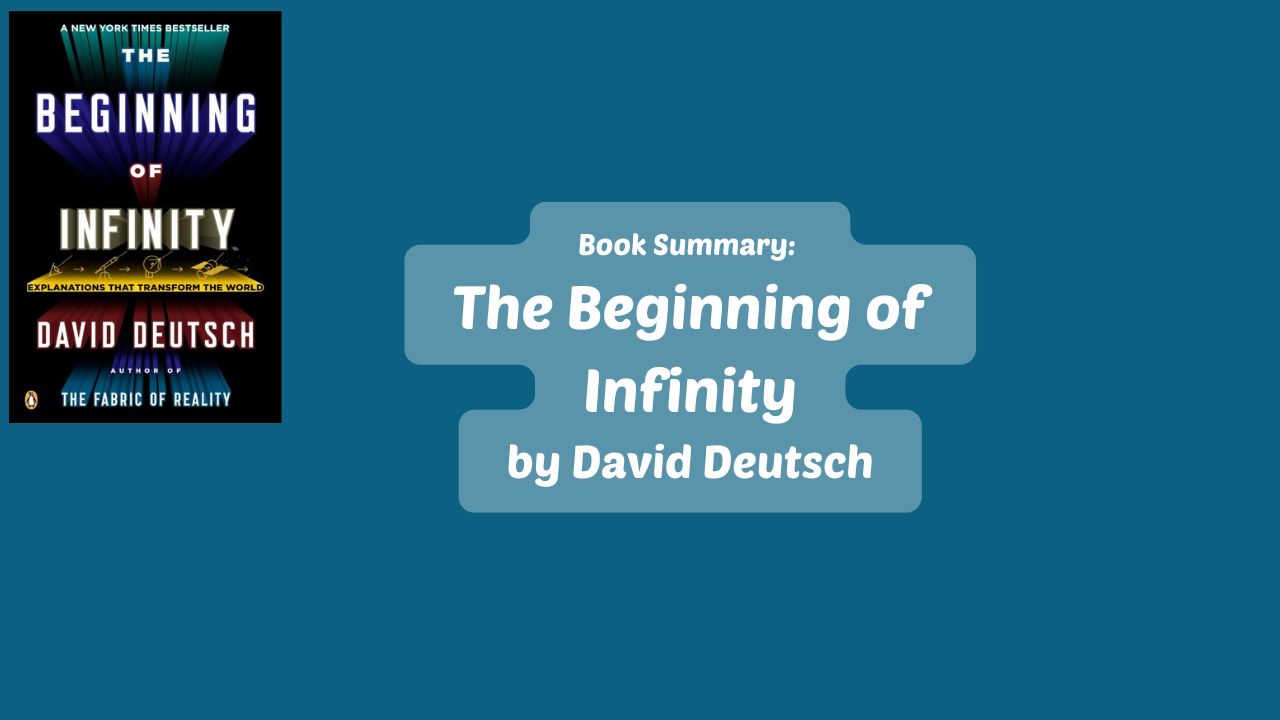
The Beginning of Infinity#
“The Beginning of Infinity: Explanations That Transform the World” by David Deutsch is a complex exploration of philosophy, science, and the potential for human progress. The book explores and establishes deep connections between the laws of nature, the human condition, knowledge, and the possibility for progress. This book has 18 chapters.
- Any real process is physically possible to perform provided the knowledge to do so has been acquired.
- The Age of Enlightenment was an intellectual and philosophical movement that occurred in Europe in the 17th and the 18th centuries.
- Enlightenment was the beginning of an infinite sequence of purposeful knowledge creation.
- The Enlightenment set up the conditions for knowledge creation which disrupted the static societies that previously existed
Here’s a chapter-by-chapter summary:
The Reach of Explanations - Deutsch argues that the power of science and human understanding is unlimited, and that through proper explanations, we can achieve an infinite understanding of the universe.
Closer to Reality - This chapter discusses the evolution of scientific understanding and the role of explanations in coming closer to the true nature of reality.
The Spark - Exploring the nature of scientific and creative sparks of genius, Deutsch examines how innovations in understanding or technology can lead to rapid, transformative changes.
Creation - The focus here is on the concept of human creativity as a unique process of generating new explanations and ideas that lead to progress.
The Reality of Abstractions - Deutsch argues that abstract entities (like numbers, algorithms) are real because they have causal powers in the physical world.
The Jump to Universality - An exploration of how certain theories or technologies, due to their ‘universal’ applicability, can lead to dramatic transformations across various fields.
Artificial Creativity - The possibility of machines being able to create and innovate independently of humans, and what this means for the future of human creativity and machine intelligence.
A Window on Infinity - Discusses how the use of technology extends human reach, enabling us to explore and understand the infinite.
Optimism - Deutsch argues that with the right knowledge, any problem is solvable, and thus, we should adopt an optimistic outlook towards the future of humanity.
A Dream of Socrates - Reflects on the philosophical implications of our understanding of the universe and the pursuit of knowledge.
The Multiverse - An exploration of the concept of the multiverse and how this theory changes our understanding of reality and our place within it.
A Physicist’s History of Bad Philosophy - Critiques various philosophical positions that Deutsch argues have hindered scientific progress and understanding.
Choices - Discusses the philosophical implications of choice, free will, and the nature of decision-making in an infinite universe.
Why Are Flowers Beautiful? - Explores the idea of beauty from an evolutionary and scientific perspective, questioning why we find certain things beautiful and how this relates to the laws of the universe.
The Evolution of Culture - Looks at how culture evolves using mechanisms similar to those in biological evolution, and how cultural changes contribute to human progress.
The Evolution of Creativity - Deutsch delves into how creativity itself has evolved and continues to evolve, driving human progress and understanding forward.
Unsustainable - Challenges the concept of sustainability as it is commonly understood, proposing instead that progress is inherently sustainable.
The Beginning - Reflects on the idea that with the right knowledge, humanity is just at the beginning of its potential to achieve infinite understanding and improvement.
This book combines philosophical inquiry with scientific exploration, proposing that through the pursuit of good explanations, humanity can achieve boundless growth and understanding.


Comments: